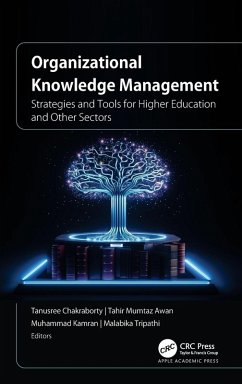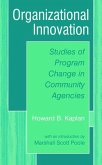Organizational Knowledge Management
Strategies and Tools for Higher Education and Other Sectors
Herausgegeben:Chakraborty, Tanusree; Awan, Tahir Mumtaz; Kamran, Muhammad; Tripathi, Malabika
Organizational Knowledge Management
Strategies and Tools for Higher Education and Other Sectors
Herausgegeben:Chakraborty, Tanusree; Awan, Tahir Mumtaz; Kamran, Muhammad; Tripathi, Malabika
- Gebundenes Buch
- Merkliste
- Auf die Merkliste
- Bewerten Bewerten
- Teilen
- Produkt teilen
- Produkterinnerung
- Produkterinnerung
This new volume explores the multifaceted landscape of knowledge management, with a particular emphasis on its application in higher education. The book offers diverse perspectives, strategies, and tools to enable global institutions to succeed and remain competitive in today's disruptive business environment. Recognizing higher education as a conduit for global knowledge acquisition, propagation, and continuous learning, the book discusses the interplay between technologies, techniques, and people, the strategic value of knowledge, the role of reward systems, and the significance of tacit…mehr
Andere Kunden interessierten sich auch für
![Organizational Science Abroad Organizational Science Abroad]() Organizational Science Abroad113,99 €
Organizational Science Abroad113,99 €![Climate Risks as Organizational Problems Climate Risks as Organizational Problems]() Theresa CastorClimate Risks as Organizational Problems98,15 €
Theresa CastorClimate Risks as Organizational Problems98,15 €![Organizational Innovation Organizational Innovation]() Howard B. KaplanOrganizational Innovation77,99 €
Howard B. KaplanOrganizational Innovation77,99 €![Principles and Practices of Management and Organizational Behavior Principles and Practices of Management and Organizational Behavior]() Chandrani SinghPrinciples and Practices of Management and Organizational Behavior173,99 €
Chandrani SinghPrinciples and Practices of Management and Organizational Behavior173,99 €![Climate Risks as Organizational Problems Climate Risks as Organizational Problems]() Theresa CastorClimate Risks as Organizational Problems46,85 €
Theresa CastorClimate Risks as Organizational Problems46,85 €![Organizational Innovation Organizational Innovation]() Howard B. KaplanOrganizational Innovation77,99 €
Howard B. KaplanOrganizational Innovation77,99 €![Organizational Reputation Management Organizational Reputation Management]() Alexander V. LaskinOrganizational Reputation Management51,99 €
Alexander V. LaskinOrganizational Reputation Management51,99 €-
-
-
This new volume explores the multifaceted landscape of knowledge management, with a particular emphasis on its application in higher education. The book offers diverse perspectives, strategies, and tools to enable global institutions to succeed and remain competitive in today's disruptive business environment. Recognizing higher education as a conduit for global knowledge acquisition, propagation, and continuous learning, the book discusses the interplay between technologies, techniques, and people, the strategic value of knowledge, the role of reward systems, and the significance of tacit knowledge, presenting diverse global perspectives and showcasing strategies that foster better knowledge retention, aiming to elevate the standards of higher education.
Produktdetails
- Produktdetails
- Verlag: Taylor & Francis; Crc Press; Apple Academic Press
- Seitenzahl: 448
- Erscheinungstermin: 7. Juli 2025
- Englisch
- Abmessung: 240mm x 161mm x 29mm
- Gewicht: 776g
- ISBN-13: 9781774919866
- ISBN-10: 1774919869
- Artikelnr.: 73328107
- Herstellerkennzeichnung
- Libri GmbH
- Europaallee 1
- 36244 Bad Hersfeld
- gpsr@libri.de
- Verlag: Taylor & Francis; Crc Press; Apple Academic Press
- Seitenzahl: 448
- Erscheinungstermin: 7. Juli 2025
- Englisch
- Abmessung: 240mm x 161mm x 29mm
- Gewicht: 776g
- ISBN-13: 9781774919866
- ISBN-10: 1774919869
- Artikelnr.: 73328107
- Herstellerkennzeichnung
- Libri GmbH
- Europaallee 1
- 36244 Bad Hersfeld
- gpsr@libri.de
Tanusree Chakraborty, PhD, MBA, is a faculty member at the Centre for Management Studies at Administrative Staff College of India, Hyderabad, India. With over 20 years of academic and business experience, she has been associated with a number of business schools and universities in India. She has published books and journal papers and has presented research papers at international conferences, where she received best paper award many times. As a psychologist, she has conducted psychometric testing with over 12,000 employees and has trained over 15,000 employees during her career. Tahir Mumtaz Awan, PhD, is an Assistant Professor of Management Sciences at COMSATS University, Islamabad, Pakistan, and an Adjunct Professor at the School of Business Sciences, University of the Witwatersrand, Johannesburg, South Africa. He is also a Senior Research Fellow at the China Brand Center of the Academy of Entrepreneurship, Sun Yat-sen University, Guangzhou. Dr Awan trains executive MBA students at the Moscow School of Management in Shenzhen, China. He has delivered talks, training sessions, and keynotes on topics such as the China-Pakistan Economic Corridor, the Belt and Road Initiative, marketing in developing countries, big data, and cryptocurrencies. Muhammad Kamran, PhD, has more than 15 years of teaching and administrative experience in academia, having taught for more than eight years at different Polish universities. He has participated in national and international conferences that include Harvard University, USA. He is currently serving at the University of Warsaw, Poland, as Assistant Professor. Malabika Tripathi, PhD, is working with Maulana Abul Kalam Azad University of Technology (formerly known as WBUT), West Bengal, India, in the Industrial Psychology, Organizational Behavior, and Applied Psychology vertical. She has 14 years of work and academic experience and has been associated with business schools and universities in Kolkata and Delhi. She has published journal papers, presented research papers at several conferneces, and was a corporate trainer with government productivity councils.
Introduction PART I: KNOWLEDGE MANAGEMENT FOR HIGHER EDUCATION 1. Global
Knowledge Management Insights: Intrapreneurship in Organizational
Empowerment with a Special Reference to Turkey 2. Keeping Pace with the
Trends: An Integration of Intelligence Models and Knowledge Management
Framework for Global Higher Education Institutions 3. Organizational
Learning and Global Knowledge Management Strategies in HEIs: 'Character'
Assumes the Role of an Intermediary Between the Two! 4. Conflict Management
and Knowledge Sharing in Higher Education: Building Blocks for an Impactful
Team 5. Knowledge Management Trends in the Higher Education System in India
and Its Neighborhoods: A Critical Discourse 6. Unlocking Knowledge
Potential: Effective Practices in the Education Industry 7. Unleashing the
Synergy: Exploring the Relationship Between Knowledge Sharing, ICT, and the
Effectiveness of Knowledge Management in Higher Education 8. Nurturing a
Culture of Knowledge Sharing: Promoting Knowledge Management in Higher
Educational Institutions (HEIs) 9. Are Higher Educational Institutions
Prepared for Knowledge Management?: A Comparative Examination of
Educational Institutions 10. Knowledge Management Fatigue Syndrome:
Potential Threat to the Higher Education System 11. Competitions,
Technology, and Higher Education: Critical Reflections on the Growing
Application and Influence of Technology in Competitive Educational Training
12. Exploring the Impact of Gamification on Learning Intention in Higher
Education: Investigating the Role of Gender 13. The Interaction Between
Technologies, Techniques, and People in Higher Education 14. Global
Perspectives: A Case Study on Digital Repositories and Interdisciplinary
Research Centers in HEIs Across the Continents 15. Driving Economic Growth,
Development, and Sustainability: A System Dynamics Study on the Role of
Innovation, Skill Development, and Entrepreneurship, with a Special Focus
on India PART II: KNOWLEDGE MANAGEMENT FOR ENTREPRENEURSHIP AND ECONOMIC
GROWTH 16. A Case Study on Secrets of Knowledge Exchange: Knowledge Sharing
Practices of Faculty Members in Prominent Nigerian Higher Education
Institutions 17. Knowledge Management Black Box Through Expanded
Entrepreneurial University Model During Disruptive Ecosystems Like COVID-19
PART III: KNOWLEDGE MANAGEMENT IN THE WORKPLACE 18. Knowledge Management:
Enabling High Performance Work Culture (A Case of NLC India Ltd.) PART IV:
KNOWLEDGE MANAGEMENT IN THE BANKING AND INSURANCE INDUSTRY 19. Connecting
Internal and External Knowledge Sharing with Performance Creativity,
Problem-Solving Creativity, and Leadership Behavior in the Banking and
Insurance Industry of Pakistan PART V: KNOWLEDGE MANAGEMENT IN HEALTH AND
NUTRITION EDUCATION 20. An Overview of Information and Communication
Technology (ICT) on Health and Nutrition Education in Rural Areas
Knowledge Management Insights: Intrapreneurship in Organizational
Empowerment with a Special Reference to Turkey 2. Keeping Pace with the
Trends: An Integration of Intelligence Models and Knowledge Management
Framework for Global Higher Education Institutions 3. Organizational
Learning and Global Knowledge Management Strategies in HEIs: 'Character'
Assumes the Role of an Intermediary Between the Two! 4. Conflict Management
and Knowledge Sharing in Higher Education: Building Blocks for an Impactful
Team 5. Knowledge Management Trends in the Higher Education System in India
and Its Neighborhoods: A Critical Discourse 6. Unlocking Knowledge
Potential: Effective Practices in the Education Industry 7. Unleashing the
Synergy: Exploring the Relationship Between Knowledge Sharing, ICT, and the
Effectiveness of Knowledge Management in Higher Education 8. Nurturing a
Culture of Knowledge Sharing: Promoting Knowledge Management in Higher
Educational Institutions (HEIs) 9. Are Higher Educational Institutions
Prepared for Knowledge Management?: A Comparative Examination of
Educational Institutions 10. Knowledge Management Fatigue Syndrome:
Potential Threat to the Higher Education System 11. Competitions,
Technology, and Higher Education: Critical Reflections on the Growing
Application and Influence of Technology in Competitive Educational Training
12. Exploring the Impact of Gamification on Learning Intention in Higher
Education: Investigating the Role of Gender 13. The Interaction Between
Technologies, Techniques, and People in Higher Education 14. Global
Perspectives: A Case Study on Digital Repositories and Interdisciplinary
Research Centers in HEIs Across the Continents 15. Driving Economic Growth,
Development, and Sustainability: A System Dynamics Study on the Role of
Innovation, Skill Development, and Entrepreneurship, with a Special Focus
on India PART II: KNOWLEDGE MANAGEMENT FOR ENTREPRENEURSHIP AND ECONOMIC
GROWTH 16. A Case Study on Secrets of Knowledge Exchange: Knowledge Sharing
Practices of Faculty Members in Prominent Nigerian Higher Education
Institutions 17. Knowledge Management Black Box Through Expanded
Entrepreneurial University Model During Disruptive Ecosystems Like COVID-19
PART III: KNOWLEDGE MANAGEMENT IN THE WORKPLACE 18. Knowledge Management:
Enabling High Performance Work Culture (A Case of NLC India Ltd.) PART IV:
KNOWLEDGE MANAGEMENT IN THE BANKING AND INSURANCE INDUSTRY 19. Connecting
Internal and External Knowledge Sharing with Performance Creativity,
Problem-Solving Creativity, and Leadership Behavior in the Banking and
Insurance Industry of Pakistan PART V: KNOWLEDGE MANAGEMENT IN HEALTH AND
NUTRITION EDUCATION 20. An Overview of Information and Communication
Technology (ICT) on Health and Nutrition Education in Rural Areas
Introduction PART I: KNOWLEDGE MANAGEMENT FOR HIGHER EDUCATION 1. Global
Knowledge Management Insights: Intrapreneurship in Organizational
Empowerment with a Special Reference to Turkey 2. Keeping Pace with the
Trends: An Integration of Intelligence Models and Knowledge Management
Framework for Global Higher Education Institutions 3. Organizational
Learning and Global Knowledge Management Strategies in HEIs: 'Character'
Assumes the Role of an Intermediary Between the Two! 4. Conflict Management
and Knowledge Sharing in Higher Education: Building Blocks for an Impactful
Team 5. Knowledge Management Trends in the Higher Education System in India
and Its Neighborhoods: A Critical Discourse 6. Unlocking Knowledge
Potential: Effective Practices in the Education Industry 7. Unleashing the
Synergy: Exploring the Relationship Between Knowledge Sharing, ICT, and the
Effectiveness of Knowledge Management in Higher Education 8. Nurturing a
Culture of Knowledge Sharing: Promoting Knowledge Management in Higher
Educational Institutions (HEIs) 9. Are Higher Educational Institutions
Prepared for Knowledge Management?: A Comparative Examination of
Educational Institutions 10. Knowledge Management Fatigue Syndrome:
Potential Threat to the Higher Education System 11. Competitions,
Technology, and Higher Education: Critical Reflections on the Growing
Application and Influence of Technology in Competitive Educational Training
12. Exploring the Impact of Gamification on Learning Intention in Higher
Education: Investigating the Role of Gender 13. The Interaction Between
Technologies, Techniques, and People in Higher Education 14. Global
Perspectives: A Case Study on Digital Repositories and Interdisciplinary
Research Centers in HEIs Across the Continents 15. Driving Economic Growth,
Development, and Sustainability: A System Dynamics Study on the Role of
Innovation, Skill Development, and Entrepreneurship, with a Special Focus
on India PART II: KNOWLEDGE MANAGEMENT FOR ENTREPRENEURSHIP AND ECONOMIC
GROWTH 16. A Case Study on Secrets of Knowledge Exchange: Knowledge Sharing
Practices of Faculty Members in Prominent Nigerian Higher Education
Institutions 17. Knowledge Management Black Box Through Expanded
Entrepreneurial University Model During Disruptive Ecosystems Like COVID-19
PART III: KNOWLEDGE MANAGEMENT IN THE WORKPLACE 18. Knowledge Management:
Enabling High Performance Work Culture (A Case of NLC India Ltd.) PART IV:
KNOWLEDGE MANAGEMENT IN THE BANKING AND INSURANCE INDUSTRY 19. Connecting
Internal and External Knowledge Sharing with Performance Creativity,
Problem-Solving Creativity, and Leadership Behavior in the Banking and
Insurance Industry of Pakistan PART V: KNOWLEDGE MANAGEMENT IN HEALTH AND
NUTRITION EDUCATION 20. An Overview of Information and Communication
Technology (ICT) on Health and Nutrition Education in Rural Areas
Knowledge Management Insights: Intrapreneurship in Organizational
Empowerment with a Special Reference to Turkey 2. Keeping Pace with the
Trends: An Integration of Intelligence Models and Knowledge Management
Framework for Global Higher Education Institutions 3. Organizational
Learning and Global Knowledge Management Strategies in HEIs: 'Character'
Assumes the Role of an Intermediary Between the Two! 4. Conflict Management
and Knowledge Sharing in Higher Education: Building Blocks for an Impactful
Team 5. Knowledge Management Trends in the Higher Education System in India
and Its Neighborhoods: A Critical Discourse 6. Unlocking Knowledge
Potential: Effective Practices in the Education Industry 7. Unleashing the
Synergy: Exploring the Relationship Between Knowledge Sharing, ICT, and the
Effectiveness of Knowledge Management in Higher Education 8. Nurturing a
Culture of Knowledge Sharing: Promoting Knowledge Management in Higher
Educational Institutions (HEIs) 9. Are Higher Educational Institutions
Prepared for Knowledge Management?: A Comparative Examination of
Educational Institutions 10. Knowledge Management Fatigue Syndrome:
Potential Threat to the Higher Education System 11. Competitions,
Technology, and Higher Education: Critical Reflections on the Growing
Application and Influence of Technology in Competitive Educational Training
12. Exploring the Impact of Gamification on Learning Intention in Higher
Education: Investigating the Role of Gender 13. The Interaction Between
Technologies, Techniques, and People in Higher Education 14. Global
Perspectives: A Case Study on Digital Repositories and Interdisciplinary
Research Centers in HEIs Across the Continents 15. Driving Economic Growth,
Development, and Sustainability: A System Dynamics Study on the Role of
Innovation, Skill Development, and Entrepreneurship, with a Special Focus
on India PART II: KNOWLEDGE MANAGEMENT FOR ENTREPRENEURSHIP AND ECONOMIC
GROWTH 16. A Case Study on Secrets of Knowledge Exchange: Knowledge Sharing
Practices of Faculty Members in Prominent Nigerian Higher Education
Institutions 17. Knowledge Management Black Box Through Expanded
Entrepreneurial University Model During Disruptive Ecosystems Like COVID-19
PART III: KNOWLEDGE MANAGEMENT IN THE WORKPLACE 18. Knowledge Management:
Enabling High Performance Work Culture (A Case of NLC India Ltd.) PART IV:
KNOWLEDGE MANAGEMENT IN THE BANKING AND INSURANCE INDUSTRY 19. Connecting
Internal and External Knowledge Sharing with Performance Creativity,
Problem-Solving Creativity, and Leadership Behavior in the Banking and
Insurance Industry of Pakistan PART V: KNOWLEDGE MANAGEMENT IN HEALTH AND
NUTRITION EDUCATION 20. An Overview of Information and Communication
Technology (ICT) on Health and Nutrition Education in Rural Areas









